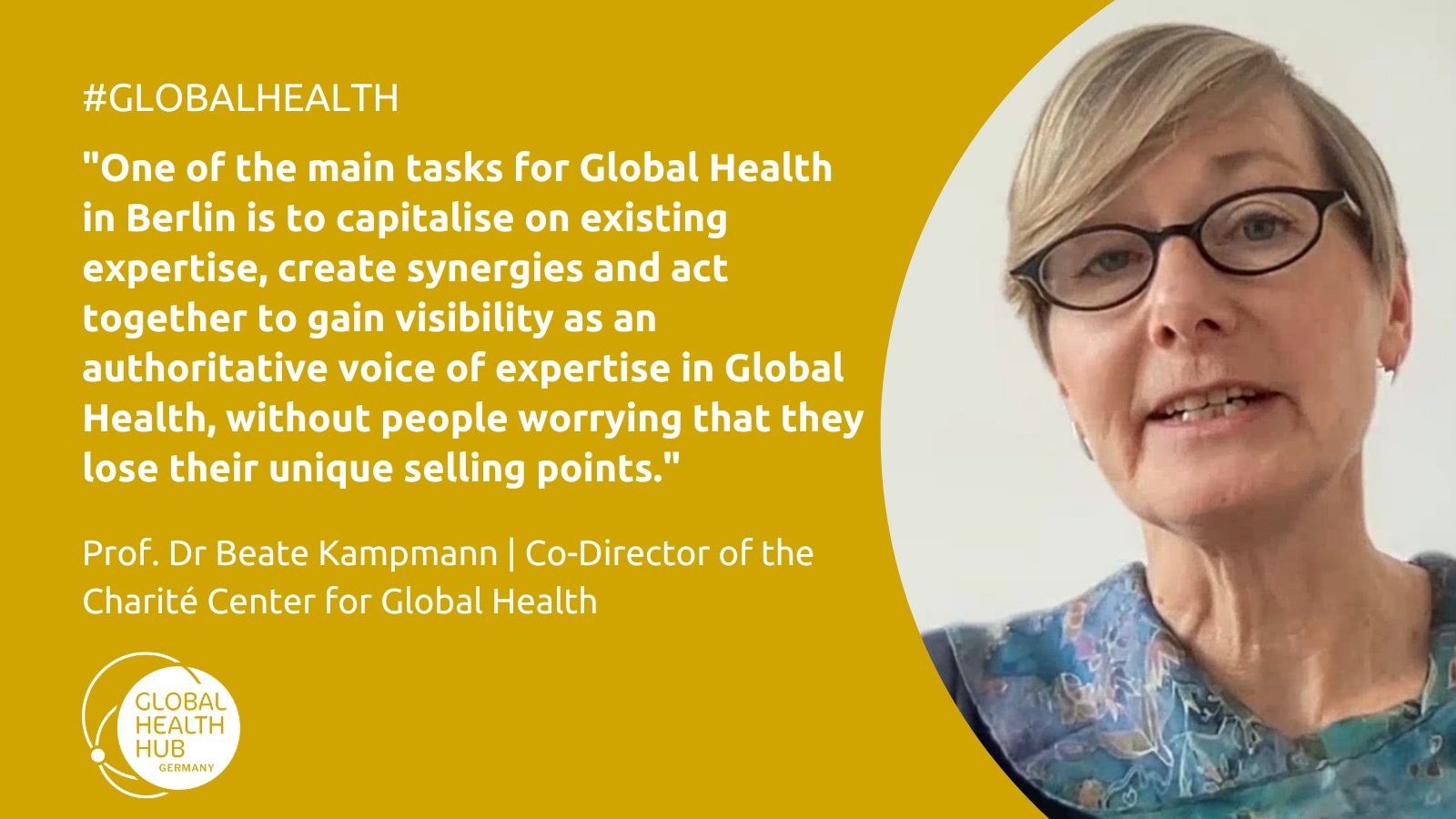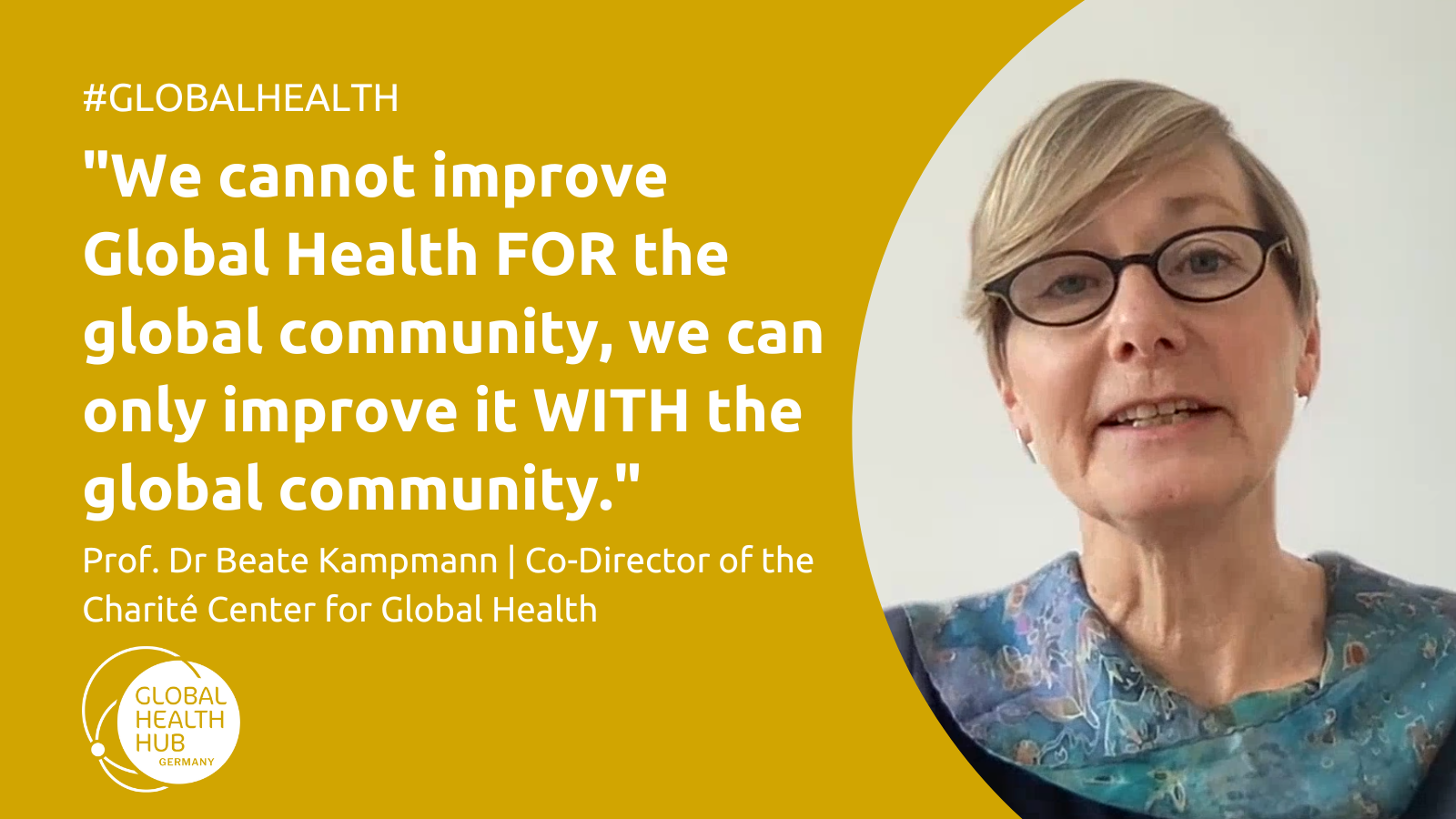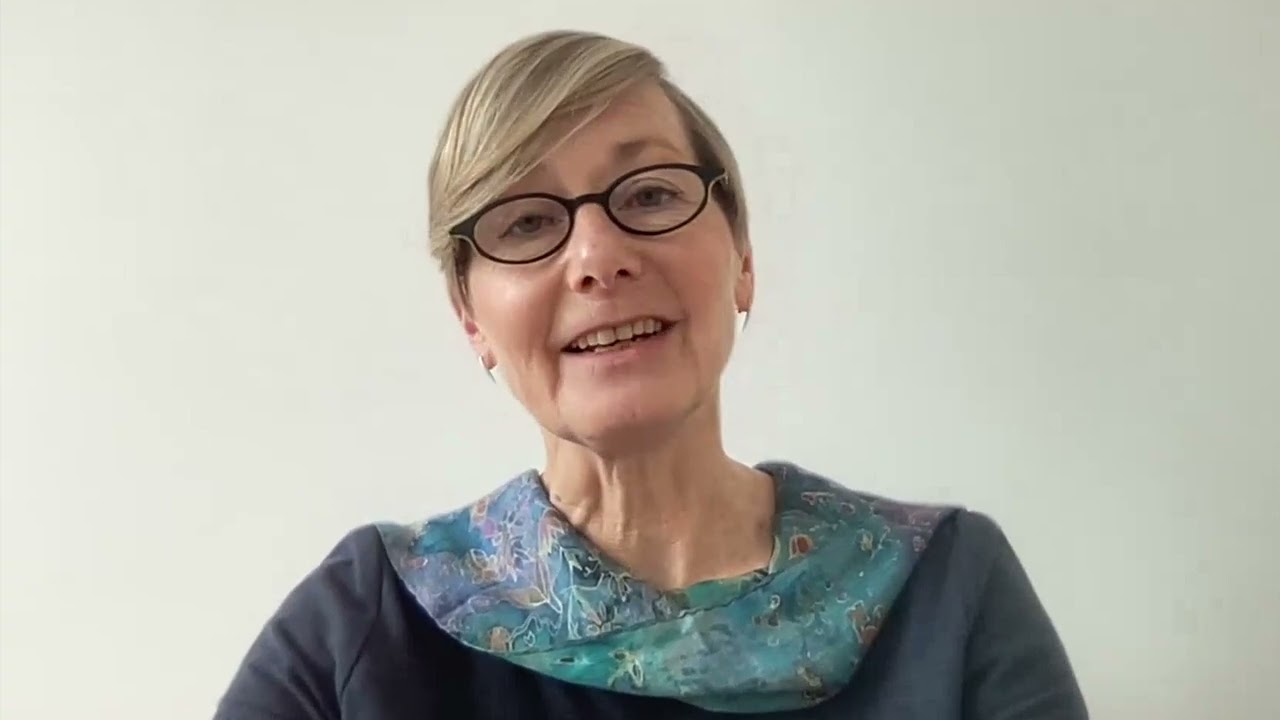”I have already encountered a lot of enthusiasm” – Interview with Prof. Dr Beate Kampmann
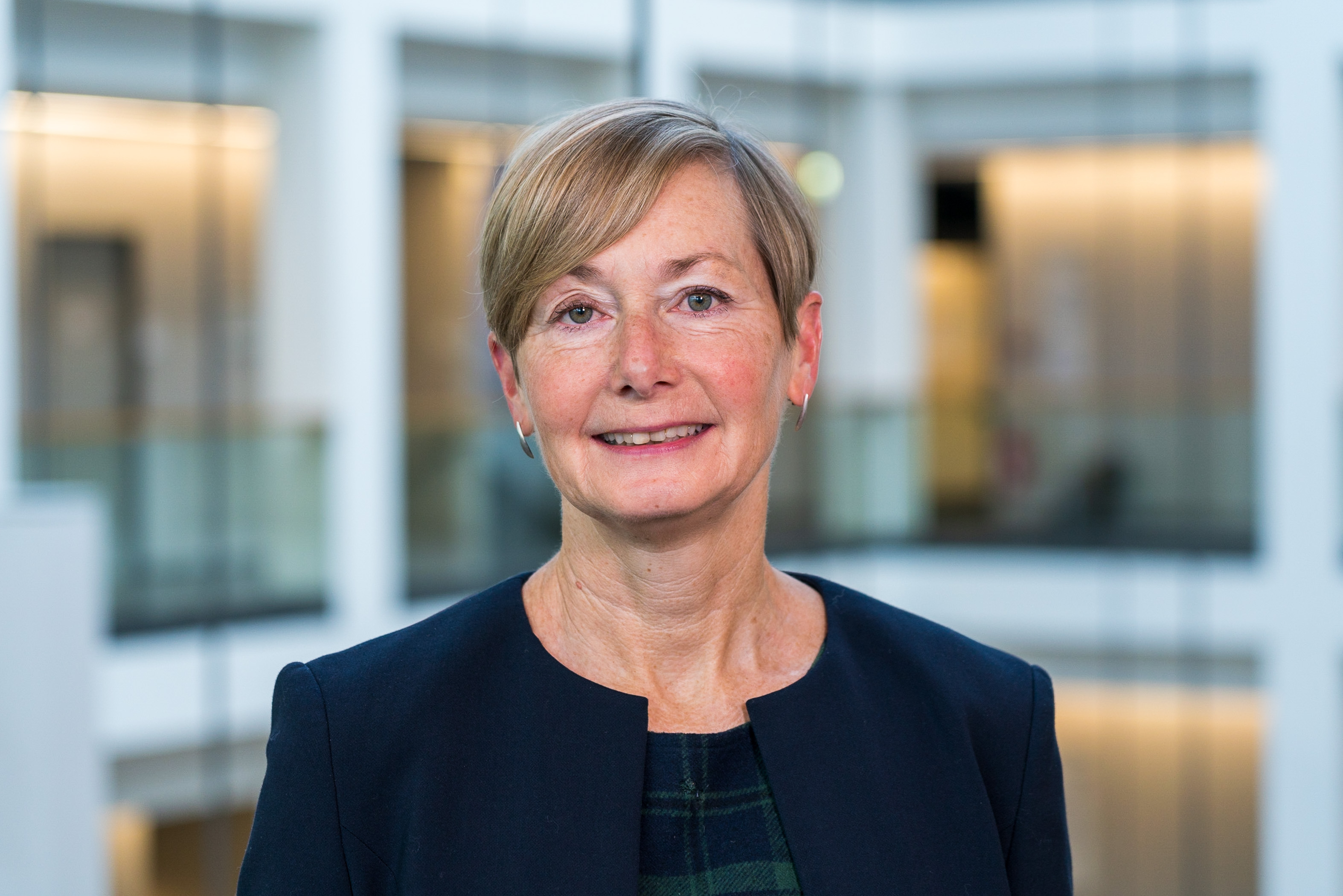
Since January 2023, Prof. Dr Beate Kampmann is Co-Director of the Charité Center for Global Health. Recapping her first 100 days, she shares with us her impressions, goals and visions.
Ms. Kampmann, you are one of the leading international experts in child health with key research areas in childhood tuberculosis, HIV co-infection and vaccinology. Since January 2023 you have a new position as Co-Director of the new Global Health Center at Charité. How did you experience the first hundred days?
Beate Kampmann: After over 30 years of working clinically and professionally in research in an English-speaking framework in the UK, the US and in Africa, my re-entry into Germany represents quite a change for me. But the position gives me a unique opportunity to hopefully make a contribution to Global Health in Germany at a time when there is much more momentum in this area, and this is why I came back.
I have already encountered a lot of enthusiasm in my first hundred days, where I have mainly focused on stakeholder mapping – trying to understand the dynamics in the global health activities initially around Charité and Berlin. That means also trying to see which people, partners, collaborations and projects already exist. I now hope to extend this to the wider German Global Health community in next steps.
What issues will the Charité Center for Global Health focus on in order to position Germany as an important partner in the field of Global Health alongside countries such as the UK and the USA?
Beate Kampmann: It’s really important to emphasize that Global Health is not a competition. It is largely collaboration. We need to really think about the important contribution that Germany can make in the global context. We should not shy away from being seen at the table of policy initiatives and international organizations such as GAVI or the WHO. We need to be a bit more proactive in Germany about this: We have experts and we can make these kinds of contributions, setting agendas and targets.
What's also important to stress is that the activities of the Center for Global Health, are not just geared towards infectious diseases. Both, Professor Drosten and myself have a background in infectious diseases. One more on the pathogen side, the other more on the host side and in vaccinology. But there are many other important topics in Global Health: For example mental health, non-communicable diseases, AMR, digitalization and many other aspects. I hope that people who are experts in those aspects, will feel equally invited being part of the Centre.
The Center for Global Health is currently formed of the Institute of Virology, the Institute of “Internationale Gesundheit” and our third important pillar, which is Global Engagement. The Global Engagement team plays a crucial role in everything we want to achieve. Because they also represent the outreach team, run a lot of the network communications and have very close links to the World Health Summit. And the World Health Summit is obviously a great link to the policy makers that we can only embrace throughout the Center and it's a key asset of the current setup of the Center.
In an interview with the Tagesspiegel you said that your goal is for German universities to become more involved in Global Health and thus become more visible internationally in this area. How are you proceeding to achieve this goal?
Beate Kampmann: I guess, this is where I’m best placed. I’m an academic primarily. I am also a clinician. In my view, Academia has an important role to play in Global Health, because our researchers are major drivers in innovation and also in education.
We need to open up our facilities and knowledge to colleagues in resource-poorer settings as well. And we need to listen to the needs from the colleagues on the ground. Because we don't know what people need unless we ask them. It would be a fantastic opportunity to offer a Global Health PhD program and postdoctoral fellowships embedded in this multidisciplinary field of action that Global Health represents. We have so many fantastic key experts in Berlin universities and across Germany as well who can contribute to this.
Another goal of yours was to bring together “the puzzle of the numerous initiatives and the individual disciplines” that exist in Berlin concerning the topic of Global Health. What steps would you like to go forward with to achieve this goal?
Beate Kampmann: The key function of the position is to provide a roof over the head of the many “rooms” in which excellent work and research is already happening. So, one of the main tasks for Global Health in Berlin is to capitalise on existing expertise, create synergies and act together to gain visibility as an authoritative voice of expertise in Global Health, without people worrying that they lose their unique selling points. Since it's such an important general topic, we need to share insights and ideas.
Also, we need to develop a better way to work across disciplines. Facilitating initiatives like the Berlin University Alliance where people from all the four universities can collaborate with their methodology and their expertise – that's a very good start.
Besides the science per se, my job has a major academic network function. What we can provide is a forum where diverse groups and initiatives can present their work. It’s really their work and it doesn’t take anything away from anybody. And we need to put in joint grants through Academia and through the Center for Global Health to give momentum to the collaborations.
Not least one of our tasks is to improve the prospects of career development in Global Health. It cannot be that there are no clinician scientists programs in Global Health, for example. In addition, people have to almost beg in their departments for time to dedicate to their research, that's sometimes based abroad. Here needs to be a lot more leadership from heads of departments as well that can facilitate career development in Global Health. It’s a necessity to go and work with collaborators on the ground, not a luxury.
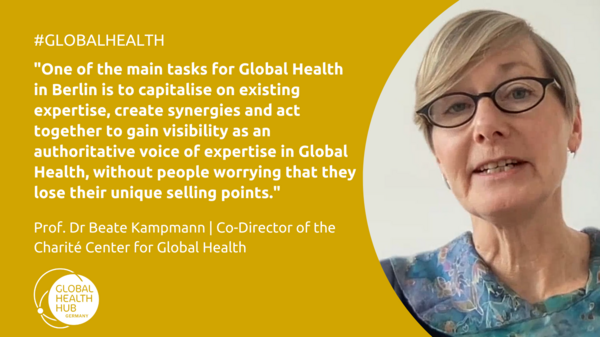
Can you name three central aspects that should distinguish Berlin as a vibrant hub for Global Health in the future?
Beate Kampmann: Well, there are so many assets in Berlin, so thinking about three key ones is hard. First, there is already a lot of critical mass in town. Berlin has four quite different universities. The University Alliance, for example is a start to create more interdisciplinarity. The second bit which has also attracted me to this location particularly is the direct access to decision makers. They are virtually next door from the campus in Mitte where I primarily work. The third bit, and again this is the reason why I find myself here: Berlin really is a global city and has always been a hub of innovative ideas. Applying this to Global Health, we can harness the potential of this broad mix of populations and talents in town to make a recognized contribution to the Global Health agenda for Germany and act as a forum for evidence-based advice for stakeholders.
Where do you see challenges nevertheless?
Beate Kampmann: There is definitely an enormous challenge currently to keep focus on global issues when there are other problems that bother people in their personal life on a daily basis. That kind of accounts for politicians as well. However, to see how the individual stresses – be it costs of living, be it environment etc. – also relate to the global context is really important. The media can play a big role in pointing this out. Going further than that, the funding system for Global Health in Germany is very tricky. It does make it very difficult to build equitable partnerships with institutions abroad because they are not really empowered to hold funds themselves. As everything is delivered through the German institutions that will always end up in a sort of “giver and receiver”-relationship. Ultimately, we need to grow beyond this.
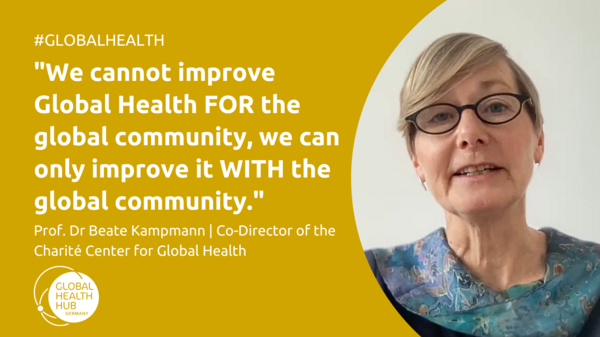
When you look back five years from now: what is it that you would have liked to achieve in your position as the Co-Director of the Charité Center for Global Health?
Beate Kampmann: So, in Africa we say it takes a village to raise a child. In a sense the same is true for the Center and also for Global Health in general. It takes a community to address these challenges. I hope that the community of Global Health researchers in the Center at Charité, in Berlin and possibly also across Germany can come together and work jointly for achieving goals that will suit the global and not just the local or national community.
If I had to think about indicators of success and that's something that I consider very carefully now, I would like to mention three things: One is that the Charité Center for Global Health becomes an internationally recognized Center of Excellence for Global Health expertise. That relates a little bit to my answer to the last question. Plus, that local and international partners can achieve visibility and sustained collaborations. It's really important for me to bring in our Global Partners into this endeavor of visibility and interactions. And then the third one, which I have also briefly mentioned, is that funding from German governmental agencies and investment in Global Health happens in a spirit of trust into global partnerships. And to trust that funds can be administered by other institutions in a reliable and verifiable way. In the longer term it is absolutely essential if you want to move away from what I call “Safari Science” where some person has a project, goes to a country, does it for two or three years and then everything changes. Finally, we cannot improve Global Health FOR the global community, we can only improve it WITH the global community. And we are all part of this community.
This interview was conducted by Julia Schmitt.
Image Source: Charité / Artur Krutsch
Interview with Prof. Dr Beate Kampmann, Co-Director of the Charité Center for Global Health
